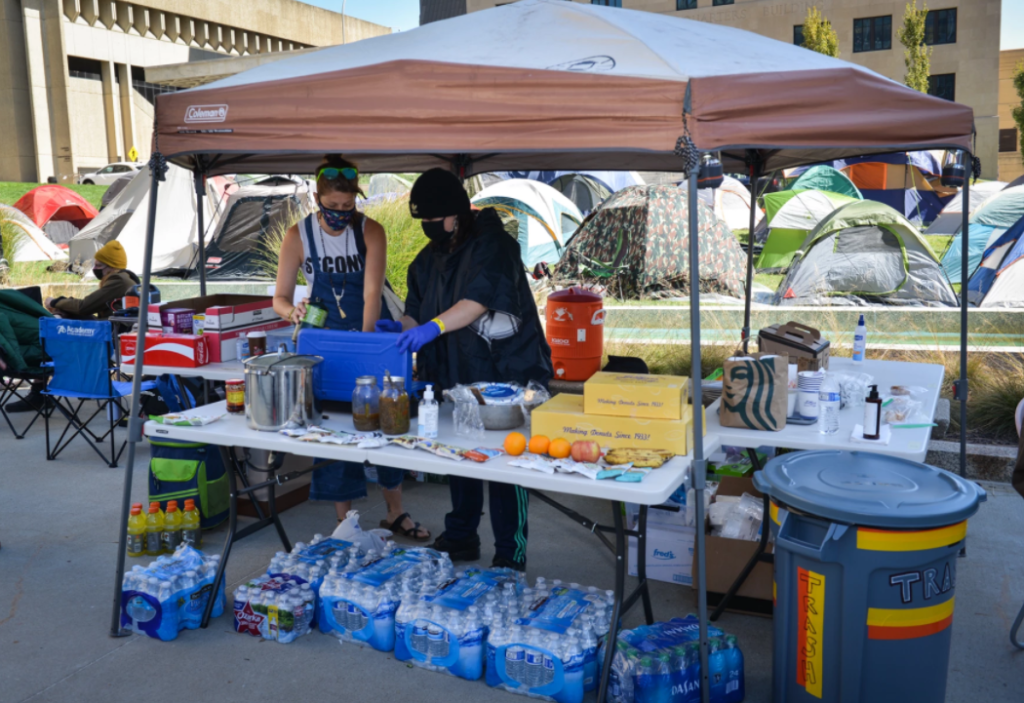Protestors took over the steps of City Hall during a 21-day occupation protest for police reform, turning a portion of downtown Kansas City into a camp.
The average number of protesters for each day peaked at 60, with demonstrators living in a camp that featured dozens of tents, an improvised kitchen, numerous banners and other written messages. The occupation ceased Friday as temperatures dropped. Members have begun talks with city officials about reallocating funding away from the police department, one of the group’s primary demands.
“We are here so people can keep living. We are here so people don’t have to spend everyday afraid, afraid of whether they are going to be [expletive] murdered by a police officer,” 19-year-old protester Jude Stocker said.
The protests began after a video surfaced on Twitter which showed footage of a Kansas City Police Department officer kneeling on the back of Deja Stallings, a pregnant Black woman, during a Sept. 30 arrest. The activists demanded the city fire Police Chief Rick Smith, fire the officer involved in the viral incident and slash the police budget by 50%.
“This is one component to a multilateral approach to put leverage on the people who have the power to make decisions,” a protester identifying himself as Jean Valjean said. “This makes people uncomfortable, and that’s the intent. Nothing ever changed from a place of comfort.”
The occupation has been supported by a number of groups, including the local chapters of the Sunrise Movement, the Urban League, the NAACP, Black Rainbow, Guardians of the City, KC Tenants and Stacy Shaw Law. However, protesters and advocates have been disappointed by the lack of support from UMKC.
“I hope that we see more engagement with the student body at UMKC on this issue,” said local activist Justice Horn, who advised the protesters and mediated discussions. “I know we have a body that is active and seeking ways to be active in the community.”
Horn, 22, who is a former UMKC Student Government Association president, said he was unaware of any UMKC students or organizations who supported the cause. Protesters on the ground shared the sentiment, saying they didn’t know of any donations from the university or student participants.
Kansas City Mayor Quinton Lucas has also shared a reluctance to support the protesters by previously stating that the group’s demands were unrealistic. Horn said the demands are not unrealistic and can be accomplished in a number of ways. Horn also blamed inaction on the part of the city as the cause for the occupation protest.
“I think he needs to broaden his horizons,” protester Sundiata Moon said of Mayor Lucas. “I think he needs to reconnect with the people.”
Many protestors had stories of police accosting them or someone close to them. Valjean spoke of the Black Lives Matter protests on the Country Club Plaza, where he witnessed a 16-year-old girl get hit in the face with the butt of a police weapon. Moon spoke of taking photos at night and having the police called on him because a neighbor thought his camera was a gun. Moon said he had to drop the camera when confronted by police, which resulted in the camera being damaged.
“I come from an environment where cops just hurt people,” said protester Elijah Xavier. “Some cops just aren’t doing the right thing. No matter the race, we all bleed red. We are all human.”
Xavier, who was at the occupation for the entire three weeks, said he joined after seeing the video of Stallings.
Xavier said that Stallings’ story hurt him personally “It’s kinda like if my sister was hurt,” he said. “Who would speak up for her? That comes to me.”
All of the protesters interviewed also spoke on their plans to vote in the upcoming presidential election. Stocker, Horn, and Valjean also emphasized the importance of the local elections on the effect of one’s day to day life and local police reform.
“There are criminal justice implications at every level on the ballot,” said Horn.
When asked about the potential legacy of the protest, Xavier said he thought it could help the community and maybe bring them closer together. Stocker said he wanted the city to reinvest into life-affirming communities.
“I just want people to stop dying,” said Moon.
rgs9td@mail.umkc.edu








